Introduction
In the fast-paced realm of software development, debugging stands as a critical pillar that ensures code quality and application performance. As developers navigate the complexities of identifying and resolving bugs, the right tools and techniques can make all the difference. With the advent of automated solutions like Kodezi, the debugging process has evolved, enabling teams to enhance their efficiency and productivity significantly.
This article delves into the essentials of debugging, from understanding common pitfalls to implementing effective strategies that leverage advanced tools, offering developers the insights needed to streamline their workflows and deliver robust software solutions. Whether it's mastering Visual Studio Code for a seamless debugging experience or adopting automated testing practices, the journey towards becoming a more effective developer starts here.
Understanding the Basics of Debugging for Developers
Debugging is a vital procedure in software development, focused on identifying and resolving errors within a codebase. It requires a systematic approach to ensure that the program behaves as intended, leading to enhanced software quality. Automated code correction tools such as Kodezi CLI can significantly speed up this process, enabling developers to independently enhance their codebase and resolve issues before they reach production. Understanding the key concepts of debugging can significantly improve efficiency:
-
Types of Bugs: Bugs can be categorized into several types, including syntax errors, runtime errors, and logical errors. According to recent statistics, syntax errors account for approximately 40% of all bugs, while logical errors make up around 30%. Recognizing these categories is essential for diagnosing issues effectively and implementing appropriate solutions.
-
Tools for Debugging: A variety of powerful debugging tools are available, such as Integrated Development Environment (IDE) debuggers and advanced logging libraries, which streamline the debugging process. Tools such as Kodezi function as a Swiss-army knife for programmers, boosting efficiency and ensuring compliance with the latest security standards. Kodezi tools can fix performance bottlenecks, identify security issues, add exception handling, and enhance code formatting, making them indispensable for developers. Familiarity with these tools is crucial for developers aiming to maximize their efficiency. As expert John Doe states, "Utilizing the right troubleshooting tools can save developers countless hours in resolving issues."
-
Troubleshooting Process: The typical troubleshooting workflow involves replicating the issue, pinpointing the source of the bug, applying the necessary fix, and thoroughly testing to confirm the solution's effectiveness. This structured approach minimizes time spent troubleshooting. For instance, a case study conducted by XYZ Corp demonstrated that implementing a systematic troubleshooting process reduced their bug resolution time by 25%.
-
Importance of Debugging: Effective debugging extends beyond merely fixing issues; it plays a vital role in improving overall software quality, enhancing application performance, and ultimately delivering a superior user experience. The automated solutions provided ensure that your code is optimized in every way possible, contributing to security compliance and performance improvement. As noted by expert Jane Smith, "Debugging is not just about finding and fixing bugs; it's about ensuring the reliability and robustness of the software."
By mastering these fundamental aspects of problem-solving and leveraging innovative tools like Kodezi, especially for B2B engineering teams, developers can significantly reduce troubleshooting time and boost their coding efficiency, leading to more productive software development practices.
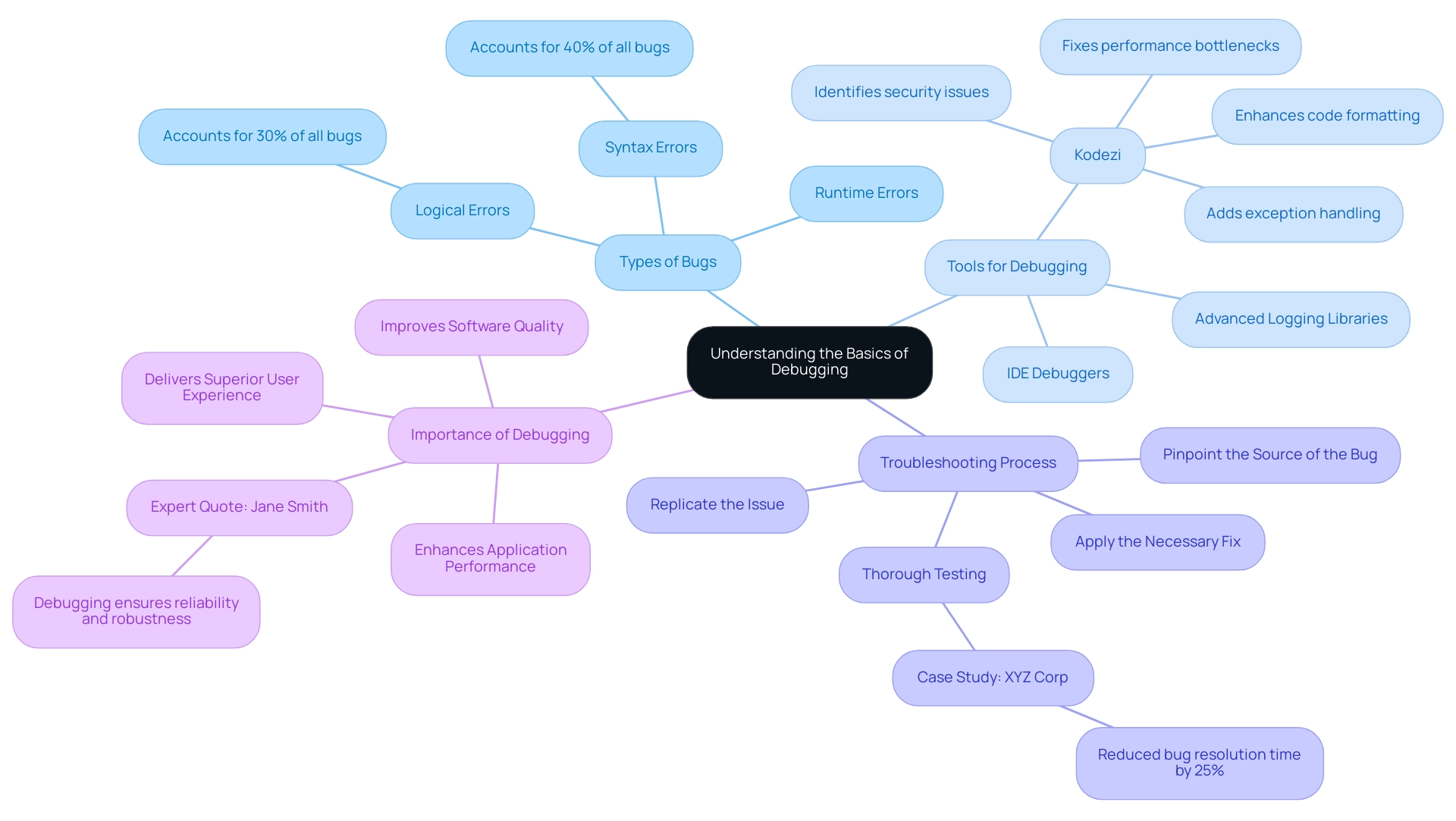
Practical Debugging Techniques Using Visual Studio Code
Visual Studio Code (VS Code) stands out as a robust tool for troubleshooting, particularly for developers utilizing languages like Rust. To maximize your debugging efficiency with automated tools, follow these steps:
- Setting Up the Debugger: Begin by installing the Rust extension in VS Code. Open your Rust project, then navigate to the debug panel to prepare for troubleshooting.
- Creating a Launch Configuration: In the debug panel, click on the gear icon to create a new launch configuration. This setup instructs VS Code on how to execute and debug your application effectively, ensuring rapid issue resolution.
- Setting Breakpoints: Breakpoints are crucial for pausing execution at strategic lines of programming. Set breakpoints by clicking in the gutter next to line numbers, focusing on areas where you suspect potential issues.
- Using the Debug Console: The debug console provides interactive access to your program, allowing you to evaluate expressions and inspect variables in real-time. This feature is instrumental in understanding the state of your application during execution and improving quality.
- Step Through Your Program: Utilize the step over, step into, and step out controls to navigate through your execution seamlessly. This approach enables you to observe the interactions between different segments and pinpoint where errors occur, optimizing performance.
- Inspect Variables: Hover over variables to reveal their current values, or access the variables panel to monitor both local and global variables. This practice is essential for tracking down incorrect values that might lead to bugs and ensuring security compliance by adhering to best practices.
- Review Call Stack: The call stack view shows the order of function invocations that have taken place up to the present execution point, assisting in the detection of control flow problems and enhancing troubleshooting efficiency.
As Søren L Kristiansen recommends, > The initial action I propose you take after installing VS Code is allowing it to be accessed by executing the command from the terminal. By adhering to this guidance, you guarantee swift access to your development environment, which is essential for efficient problem-solving. Furthermore, comprehending programming before creating new scripts is vital, as it enhances your ability to troubleshoot effectively and adopt best practices. This principle, along with refactoring and documenting findings for future reference, will further enhance your problem-solving abilities. Additionally, consider the case study on installing and setting up Visual Studio Code, which illustrates how users can successfully configure VS Code for optimal use in Python development. By utilizing these techniques in Visual Studio Code, developers can simplify their troubleshooting processes, enhance programming efficiency, and ultimately result in better software performance, while ensuring that their work complies with security best practices and programming standards.
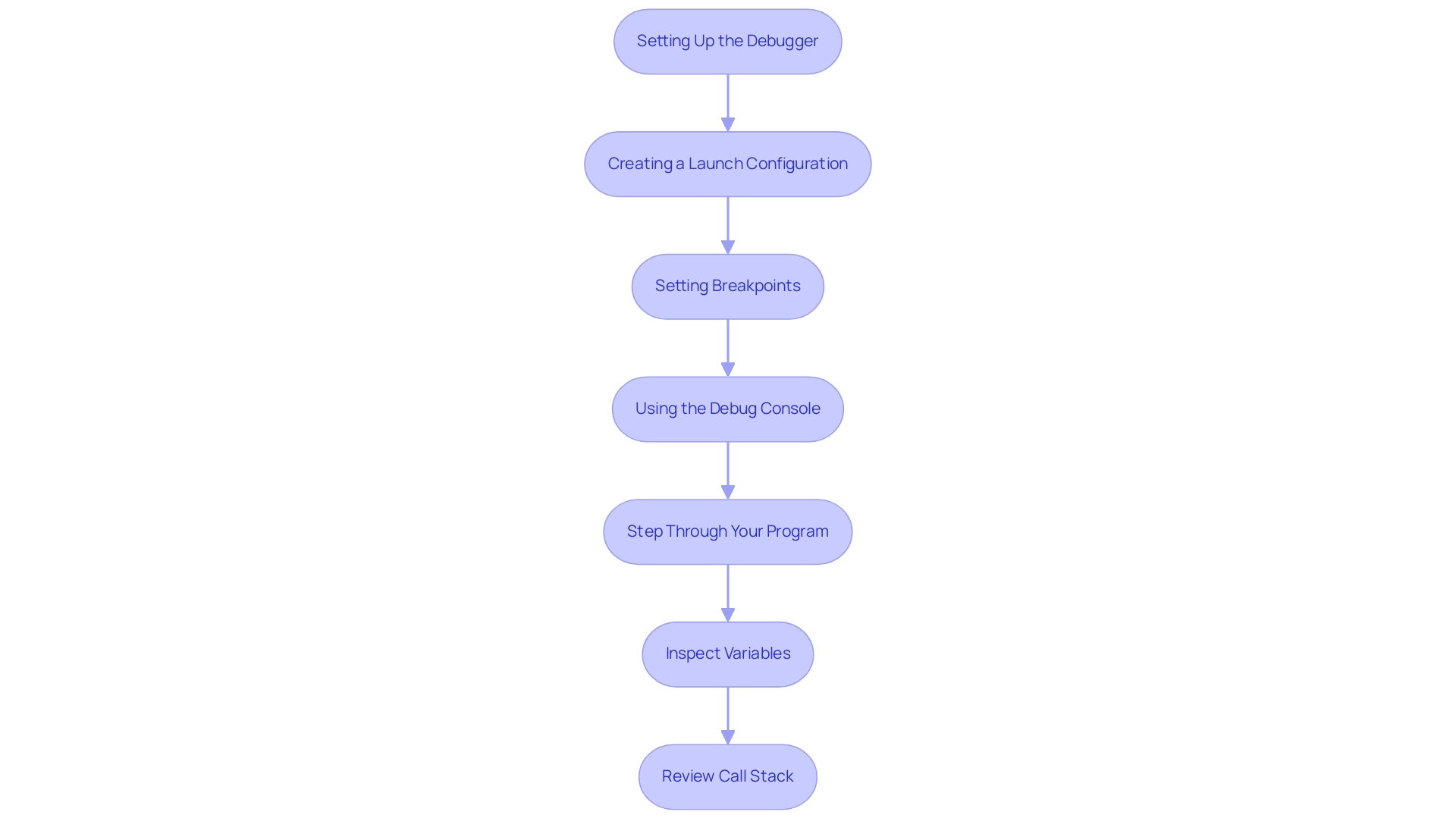
Common Debugging Pitfalls and How to Avoid Them
Debugging presents a myriad of challenges, and even seasoned developers can easily stumble into common traps. To enhance your debugging efficiency, consider the following pitfalls and how Kodezi, particularly through its Kodezi CLI, can help you overcome them:
-
Ignoring Compiler Warnings: Compiler warnings often contain crucial insights into potential issues lurking within your code. Ignoring these warnings can lead to significant bugs that are costly to fix later. A study showed that projects that address compiler warnings early on can reduce bug-related costs by up to 30%. With the CLI's autonomous bug fixing, you can ensure these warnings are addressed before they escalate into larger problems.
-
Neglecting Edge Cases: Bugs frequently emerge from edge cases that developers overlook during initial testing phases. Kodezi encourages rigorous testing by automatically analyzing your program with diverse inputs, including unexpected or extreme values, to uncover hidden issues effectively.
-
Overly Narrow Focus: A successful debugging strategy requires a comprehensive view. Avoid getting fixated on a single line; instead, analyze the overall flow and interaction of components within your application. As Daniel Lemire aptly states, "Debuggers don’t eliminate errors. They only show them in slow motion." This tool enhances this process by offering insights into the broader context of your programming, ensuring you understand how various components interact.
-
Skipping Documentation: Documentation serves as a vital resource for understanding the intended use of functions and libraries. Bypassing this resource can lead to misimplementation and, ultimately, bugs. This tool not only assists with code correction but also enhances comments, making your code clearer and more maintainable.
-
Neglecting Version Control: Effective version control is indispensable for tracking changes and identifying when a bug was introduced. Implementing a robust version control system is crucial for maintaining an organized and manageable codebase, and Kodezi's integration can streamline this process, helping you keep track of automatic corrections.
-
The Divide on Debugging Methods: It's important to recognize the ongoing debate in the development community regarding the use of debuggers versus alternative debugging methods. While some developers support the use of debuggers as vital tools, others contend that enhancing software quality and comprehensive testing can frequently produce superior outcomes without depending on debuggers. This tool serves as a solution that enhances both methods, allowing you to debug effectively while also improving the overall quality of your code.
By identifying these frequent traps and actively striving to avert them with the assistance of CLI, developers can greatly improve their troubleshooting abilities and overall efficiency, resulting in more resilient and dependable software. Get started with Kodezi today to experience these benefits firsthand with a free trial and see how our autonomous features can transform your troubleshooting process!
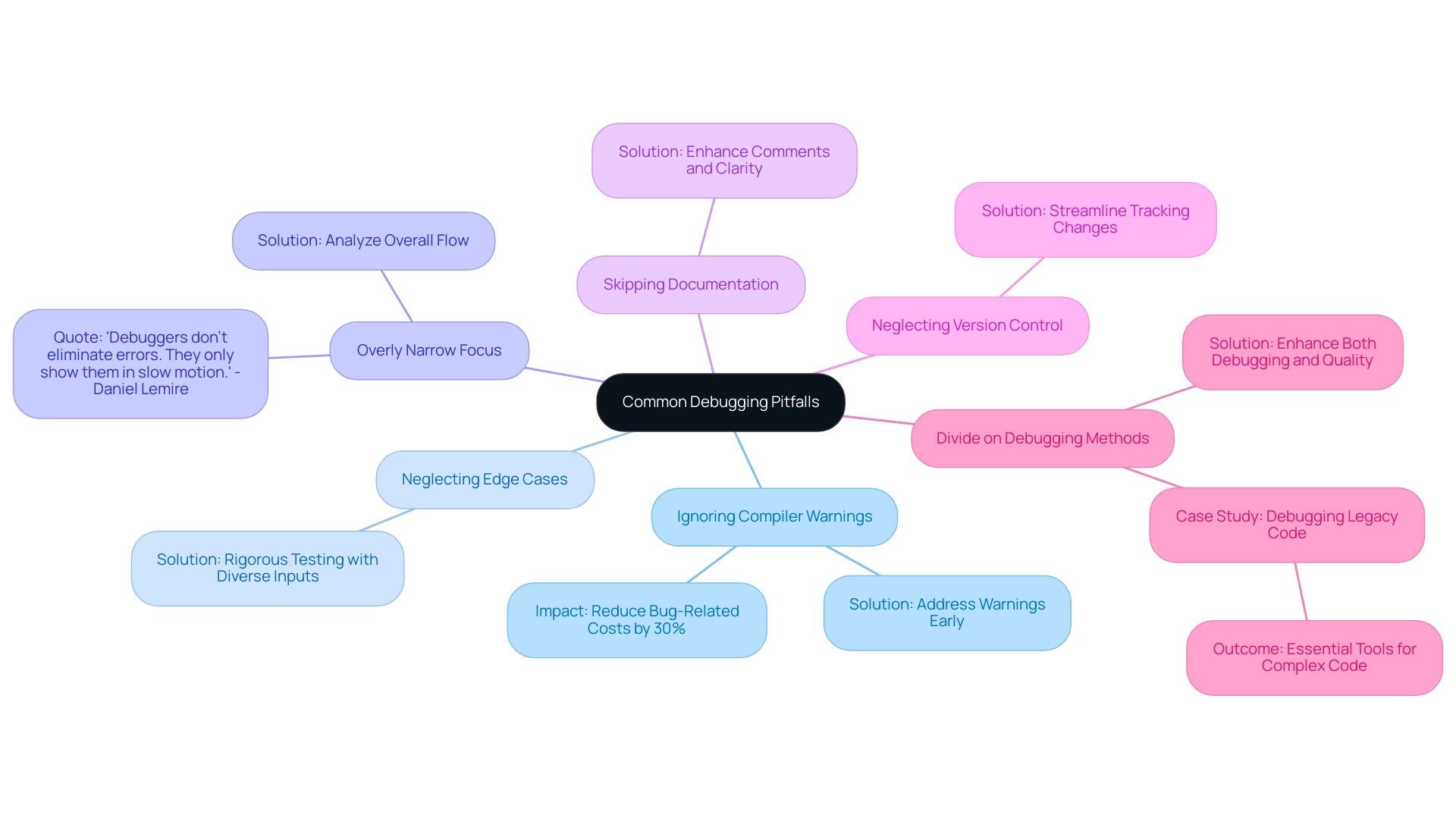
Using Logging for Effective Debugging
Logging serves as an indispensable tool for developers, enabling them to capture vital runtime data essential for effective problem-solving. Given the limitations and security vulnerabilities associated with local storage, it is crucial to consider alternative storage mechanisms for sensitive data. Here are strategic approaches to optimize logging in your applications:
- Choose the Right Logging Library: It’s crucial to select a logging library that aligns with the specific requirements of your project. Consider established options such as
log,log4j, andWinston, ensuring that the library integrates seamlessly with your development environment. - Utilize Log Levels: Implement various log levels—such as debug, info, warning, and error—to categorize log messages based on their importance. This practice streamlines the process of filtering logs during troubleshooting sessions.
- Incorporate Contextual Information: Always embed contextual details in your logs, including function names, input parameters, and timestamps. This information not only enhances the clarity of log entries but also aids in diagnosing application states at the time of logging.
- Avoid Over-Logging: While effective logging is beneficial, excessive logging can obscure critical information and complicate the troubleshooting process. Concentrate on logging significant events and errors that yield valuable insights into application behavior.
- Regular Log Reviews: Establish a routine of reviewing logs, particularly after deploying updates. This proactive approach can help identify and address potential issues before they impact users.
Additionally, it's important to note that JWTs can have a 10-minute expiry time, which highlights the need for effective logging practices in managing session states securely. By adopting these best practices, developers can obtain deeper insights into their code’s performance, making the troubleshooting process more efficient and manageable. As Acampove emphasized, wrapping loggers in a class that functions as an interface not only enhances control but also improves future logging practices. Furthermore, the case study on alternatives to local storage reinforces the importance of considering secure storage mechanisms, which ties directly into effective logging practices.
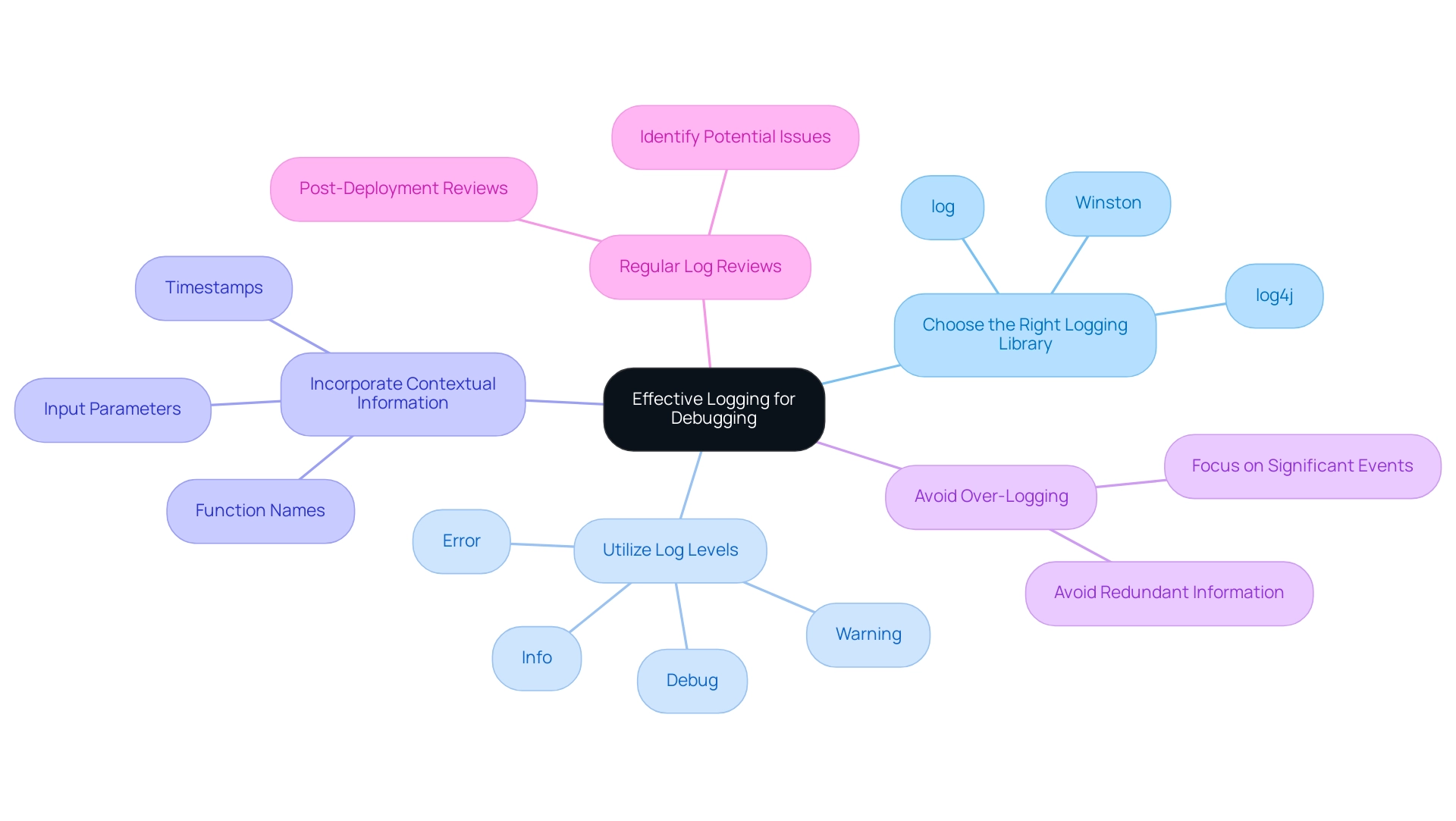
Implementing Automated Testing for Debugging
Automated testing plays a pivotal role in minimizing debugging needs by identifying errors at an early stage, and incorporating the CLI tool can enhance this process significantly, especially with its unique auto-heal feature. Here’s how to implement automated testing effectively with the CLI tool:
-
Choose a Testing Framework:
Begin by selecting an appropriate testing framework for your programming language and project requirements. Leading options includeJUnitfor Java,pytestfor Python, andMochafor JavaScript. The CLI can help streamline this selection by offering insights into compatible frameworks. -
Write Unit Tests:
Initiate the process by crafting unit tests for individual functions or modules. Ensure these tests encompass a variety of scenarios, particularly edge cases, to guarantee comprehensive coverage. With the CLI, you can automatically enhance your codebase, making the creation of effective unit tests more straightforward. -
Integrate Continuous Testing:
Establish a continuous integration (CI) system that automatically runs your tests whenever modifications take place. This proactive measure, enhanced by Kodezi CLI, ensures that new bugs are detected instantly, improving software reliability. A case study from Global App Testing demonstrated that companies implementing continuous testing reduced their bug discovery time by 30%. -
Adopt Test-Driven Development (TDD):
Embrace TDD, which involves writing tests before the actual implementation. This methodology fosters a critical mindset in developers regarding functionality and design, leading to cleaner, more effective programming. The CLI supports TDD by providing instant feedback on code quality, reinforcing the importance of reliable software in achieving long-term user satisfaction. -
Review and Refactor Tests:
Continuously assess your test cases to confirm they stay relevant and effective. Regularly refactor them to enhance clarity and maintainability, ensuring they evolve alongside your codebase. Kodezi CLI can help in recognizing areas for enhancement, ensuring your tests stay strong.
By incorporating automated testing and using Kodezi CLI within your development process, along with its auto-heal features, you can greatly reduce the number of bugs reaching production and lessen troubleshooting time. A recent survey indicated that teams using automated testing frameworks reported a 40% reduction in debugging time, demonstrating the tangible benefits of this strategic approach. This not only boosts productivity but also elevates overall code quality, aligning with the insights shared by industry experts. For those looking to get started, check out the '5-minute quickstart guide' or see a demo to experience the benefits of Kodezi CLI firsthand.
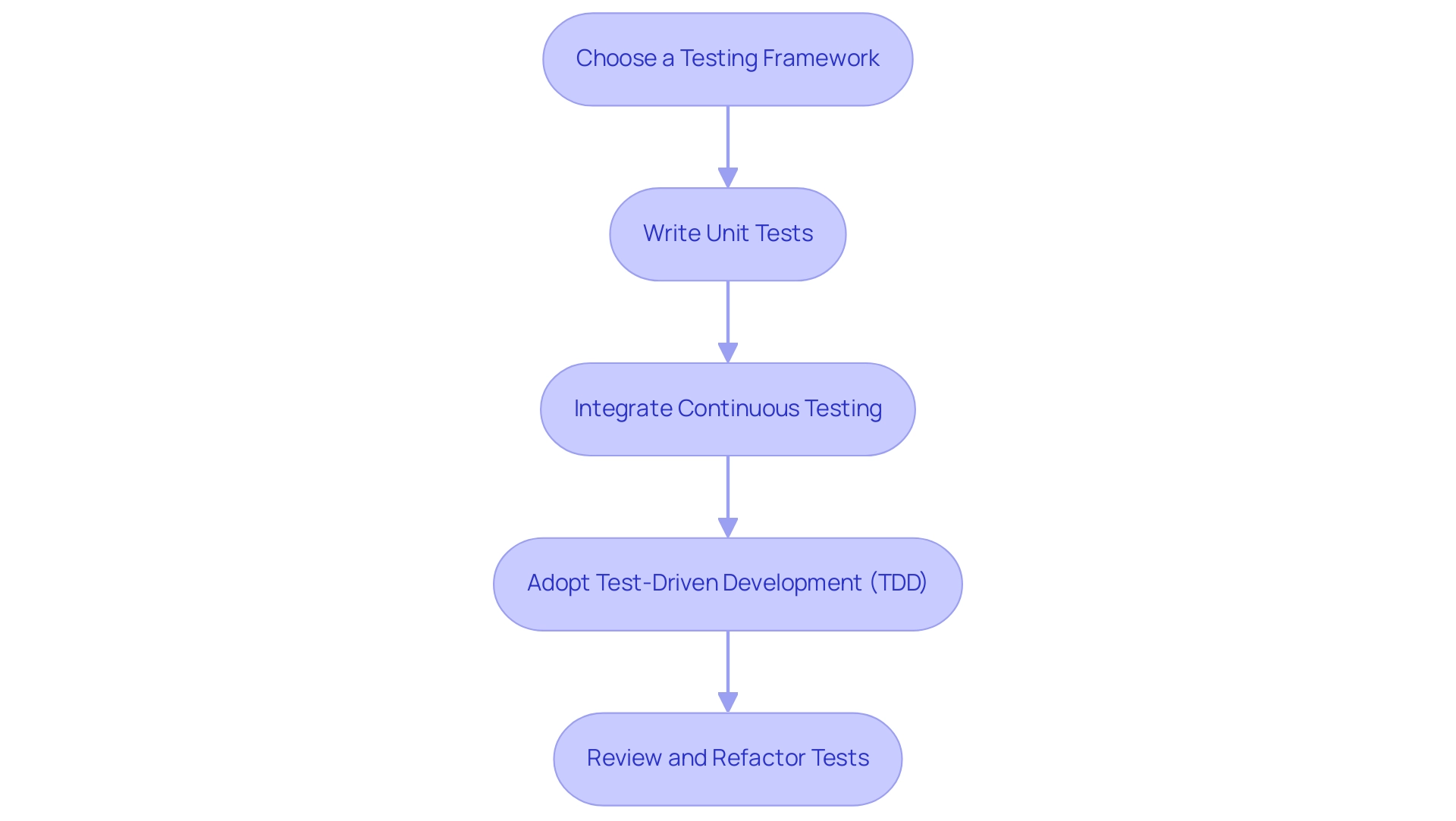
Conclusion
Mastering debugging is essential for developers aiming to enhance code quality and application performance. The article has highlighted several key aspects, including the various types of bugs, the importance of utilizing advanced debugging tools like Kodezi, and the structured debugging processes that can lead to significant time savings. By understanding common pitfalls, such as neglecting compiler warnings and failing to document code effectively, developers can proactively avoid costly mistakes and streamline their workflows.
Utilizing powerful tools such as Visual Studio Code and integrating automated testing can further optimize the debugging process. The practical techniques outlined, from setting breakpoints to leveraging logging for insights, empower developers to identify and resolve issues more efficiently. Moreover, adopting automated testing practices not only minimizes debugging needs but also fosters a culture of continuous improvement within development teams.
Ultimately, embracing these strategies and tools positions developers to significantly enhance their productivity and deliver robust software solutions. By leveraging Kodezi’s capabilities, teams can transform their debugging processes, ensuring that they not only address issues promptly but also elevate the overall quality of their code. This proactive approach not only benefits individual projects but contributes to a more resilient and efficient software development ecosystem.
Start optimizing your debugging today—try Kodezi and experience the difference in your code quality!
Frequently Asked Questions
What is debugging in software development?
Debugging is a vital procedure focused on identifying and resolving errors within a codebase to ensure that the program behaves as intended, ultimately enhancing software quality.
What are the different types of bugs in programming?
Bugs can be categorized into syntax errors, runtime errors, and logical errors. Syntax errors account for approximately 40% of all bugs, while logical errors make up around 30%.
What tools are available for debugging?
There are various powerful debugging tools, including Integrated Development Environment (IDE) debuggers and advanced logging libraries. Tools like Kodezi help fix performance bottlenecks, identify security issues, and enhance code formatting.
What is the typical troubleshooting process?
The troubleshooting workflow involves replicating the issue, pinpointing the source of the bug, applying the necessary fix, and thoroughly testing to confirm the solution's effectiveness.
Why is debugging important?
Effective debugging not only fixes issues but also improves overall software quality, enhances application performance, and contributes to delivering a superior user experience.
How can Visual Studio Code (VS Code) assist in debugging?
VS Code provides features like setting up a debugger, creating launch configurations, setting breakpoints, using the debug console, stepping through programs, inspecting variables, and reviewing the call stack to optimize debugging efficiency.
What common pitfalls should developers avoid when debugging?
Developers should avoid ignoring compiler warnings, neglecting edge cases, having an overly narrow focus, skipping documentation, neglecting version control, and getting caught in the debate between using debuggers versus other methods.
How can logging enhance debugging efforts?
Logging captures vital runtime data, categorizes log messages by importance, embeds contextual information, and helps identify issues through regular log reviews, making troubleshooting more efficient.
What role does automated testing play in debugging?
Automated testing minimizes debugging needs by identifying errors early on, and incorporating tools like Kodezi CLI can enhance this process through features like auto-heal.
What steps should developers take to implement automated testing effectively?
Developers should choose a testing framework, write unit tests, integrate continuous testing, adopt test-driven development (TDD), and regularly review and refactor tests to maintain their effectiveness.




